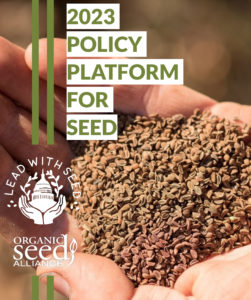Contents
Sign your name as a supporter of this platform
INTRODUCTION
Policy work is essential to building and protecting seed systems in the US. As the foundation of our food and fiber supply, a comprehensive policy platform that centers diversity, equity, health, and the public interest is long overdue. Federal laws and regulations impact many aspects of seed systems, from how much public funding is directed toward managing our national germplasm collections to the scope of intellectual property protections on our seed supply. It is imperative that seed advocates and stewards engage in advocacy to advance shared policy priorities to ensure that this living, natural resource is managed respectfully, shared appropriately, and protected for future generations.
Organic Seed Alliance (OSA) hopes the following roadmap will serve as a starting place to help policymakers identify where they can make an impact and where advocates can identify where they themselves are impacted by current policies and procedures. Some of the policy priorities will be achievable through the 2023 Farm Bill while others can move forward at the administrative, regulatory, and state levels.
Together we can shape the future of food and farming with each seed we steward and plant. Together we can shape the future of seed policy with each advocacy action we take.
What is seed advocacy?
Advocacy includes a wide range of activities to influence policy makers. It requires building capacity, relationships, and networks to leverage coordinated messaging and efforts to achieve a shared policy goal. Grassroots organizing and direct lobbying at all levels of government is the foundation of successful policy change. This work includes educating the public about issues that impact our seed supply and the growers who steward it, inspiring an activation of their voices. This work also includes public education, legislative advocacy, meetings with regulatory agencies, and at times the judicial system is required for achieving much-needed change.
What is OSA’s vision?
In the United States today, seed is mostly managed as a privatized commodity, not a living resource that requires careful stewardship. Economic, ethical, and social issues loom large, including consolidation of market and political power; egregious utility patents on naturally occurring genetic traits; cultural appropriation of plants; underfunded public seed collections and plant breeding programs; and the failed co-existence between genetically engineered (GE) and organic (and other non-GE) crops.
OSA envisions a future for U.S. policy where seed is not only managed as a commodity but as a collective commitment to our future. This work is informed by the decades of collective action carried out by major peasants and farmers movements across the globe that have fought to protect food security and steward seed for the common good. As part of this vision, growers would have adequate choice in seed free of restrictive forms of intellectual property rights (IPR) and GE traits; Indigenous seed keepers would control if, how, and when culturally significant plants are shared outside their communities; the seed industry would no longer be one of the most concentrated industries that ever existed; and public seed collections would serve the public good first, growing in capacity and diversity each year to secure a healthy and resilient food supply for future generations.
Participatory policy
Working toward this vision requires close engagement with as many seed advocates and stewards as possible, including recognizing the ancestral Indigenous and peasant seed keepers, plant breeders, and communities that originally domesticated and diversified seed and food production. It also requires a diversity of strategies for demonstrating both solidarity and resistance. To exemplify this, OSA adheres to participatory models in much of our program work. Participatory policymaking facilitates the inclusion of individuals and groups in the design of policy recommendations to achieve accountability, transparency, and engagement to influence specific needs. This approach also results in better informed policy that matches the needs of communities. To that end, we conducted a seed policy survey of constituents in our database, hosted listening sessions on some policy areas included in this platform, and used additional survey data from our State of Organic Seed project to inform strategies and recommendations. We also consulted organizations and coalition partners across the country who advocate for federal policy change that benefits farmers, farmworkers, and the communities they feed.
This policy platform builds on visionary policies that center the common good. We invite you to adopt this platform, or pieces of it, as an organization, business – and, most importantly, as an individual – who understands that to advocate for transformative seed policy is to advocate for a stronger foundation of our food system.
Key objectives of this platform
- Level the playing field for seed growers and independent seed companies
- Advance diversity, equity, and inclusion in policies and policymaking
- Resist the privatization of seeds and genetic traits
- Increase investments in public plant breeding as a climate change solution
- Support ecological seed production by expanding organic seed acreage
- Protect the genetic integrity of organic and other non-GMO seed
- Increase the diversity and quantity of organic seed available in the marketplace
Principles grounding this platform
- Seeds are a vital yet vulnerable natural resource that must be respected and managed in a manner that enhances their long-term viability and integrity.
- The maintenance and improvement of genetic and biological diversity are essential for the success of sustainable, healthy food systems and the greater global food supply.
- The equitable exchange of plant genetics, with appropriate acknowledgement, consent, and compensation, enhances innovation and curtails the negative impacts of concentrated ownership and consolidated power in decision making.
- We support grassroots policy action that empowers local and Indigenous communities to advocate for autonomy and protections in determining the usage and sharing of culturally important seeds to avoid biopiracy and inequitable appropriation.
- Sharing information enhances research and leads to better adaptation of best practices.
- Grower participation in decision-making—in the field and in policy—results in the co-creation of knowledge and shared solutions.
- Action must be taken to remove structural barriers to a just and equitable seed and food system.
- Agricultural research should have goals beyond extraction and consumption that increase the value of agroecosystems, including beneficial health outcomes for soil, plants, animals, and humans.
- Public institutions and public employees should serve the country’s agricultural needs, particularly the diverse and alternative systems less supported by the current economic system.
- Growers have inherent rights as agricultural stewards, including the ability to save, own, and sell seeds, and are key leaders in developing best practices, applicable research, and agricultural regulations and policy that affect them and the future of seed.
- Traditional Ecological Knowledge (TEK) should be recognized as the foundation of organic farming and agroecology and uplifted in partnerships and leadership
- The precautionary principle of protecting food systems from harm when scientific investigation has found potential risk helps safeguard food security in the future.
- Organic food should begin with organic seed
POLICY PRIORITIES AT A GLANCE
SEED, NOT GREED: Promote fair policies that manage seed as a living natural resource, not a consolidated corporate commodity
1. Break Up Big Seed
Stop seed industry consolidation by corporate giants to protect the rights of independent seed growers, plant breeders, and farmers.
2. Remove Barriers to Seed Saving and Research
Challenge restrictive forms of intellectual property rights (IPR) on seed and promote fair laws and policies through advocacy to Congress, the US Patent and Trademark Office, Federal Trade Commission, and US Department of Agriculture.
BUILD CAPACITY, INCREASE RESILIENCE: Demand inclusive policies that remove barriers, increase participation, and support regional adaptability to build more resilient seed systems.
3. Confront the Climate Crisis
Promote public plant breeding, decentralized seed systems, Traditional Ecological Knowledge (TEK), and organic practices as solutions to mitigating the effects of climate change and helping society adapt to these changes and their consequences.
4. Achieve Equitable Participation in Seed Systems
Advocate for policy initiatives that decentralize power in agriculture and advance equity and justice, including increasing access to seed, land, financial resources, information, political standing, and educational and professional trajectories for BIPOC and underfunded, underrepresented, or historically excluded communities.
PROMOTE THE PUBLIC GOOD: Support transparent policies that ensure accountability that public research dollars are spent addressing the needs of farmers, growers, and their communities.
5. Ensure Public Research Supports the Common Good
Advocate for increased, targeted, and diversified public research investments in organic plant breeding and seed initiatives that hold agencies accountable in prioritizing challenges faced by seed producers and establishing community-university partnerships that strengthen the links between public research and grassroots seed movements.
6. Expand Public Seed Collections
Advocate for adequate funding and management of the National Plant Germplasm System to address the backlog of seed regeneration, protect genetic diversity, and ensure equitable access by growers, breeders, and those working on rematriation as well as prioritizing community of origin seed keepers requesting access to culturally appropriate seeds.
SUPPORT ORGANIC SEED GROWERS: Advance organic policies that help protect and grow the organic seed supply including enhancing the integrity of the organic label.
7. Enhance the Integrity of the Organic Label
Strengthen the organic seed requirement, help organic producers meet the organic seed regulation, clarify which plant-breeding methods should be excluded or allowed in organic production, and support the organic seed market and the seed growers who fill this supply.
8. Address GMO Contamination
Address GMO concerns in the organic and non-GMO seed sector and advocate for strong federal policy reform to level the playing field, promote true “coexistence” between GE and non-GE farming systems, and establish fair compensation for economic and other harms associated with GE contamination.
9. Support State-Level Seed Initiatives
State-level seed policy can fill gaps at the federal level to strengthen protections for organic and non-GE seed and seed growers.
A POLICY PLATFORM FOR SEED
Break Up Big Seed

Break Up Big Seed: Stop seed industry consolidation by corporate giants to protect the rights of independent seed growers, plant breeders, and farmers.
| Summary |
| The seed industry is one of the most consolidated sectors in agriculture and as public plant breeding funding decreases, and more independent seed companies vanish, seed is increasingly in the hands of corporations that put profit before people and the planet. |
The Issue
In four decades, just four companies, all with roots in the chemical industry, came to control over 60 percent of the global commercial seed market. This level of concentrated market power increases prices, removes choices in the marketplace, squeezes out competitors, and makes our seed supply – and thus food supply – less secure. There is an urgent need for rebalancing the playing field between corporate giants and growers through policy and other advocacy actions that reveal the shortcomings of antitrust laws and enforcement, put a stop to anticompetitive mergers and acquisitions, and improve public transparency of investigations and merger reviews.
The Change We Need
- Congress should enhance antitrust laws, and the DOJ should enforce these laws, the way they were originally intended: to curtail combinations of market power that limit entry to those markets, increase prices, decrease innovation and marketplace options, and monopolize any one market.
- We also support a moratorium on new merges in the agricultural sector and a statutory cap on levels of concentration in agricultural markets.
- Congress should change patent law to prohibit utility patents on seeds, plants, and genetic traits as part of a broader strategy for increasing competition in the seed industry and slowing concentration of market power.
- Congress and regulators (the US Departments of Justice, Agriculture, and Federal Trade Commission) should continue to examine and remedy the concentrated ownership of seed through antitrust investigations, an examination of the impacts of intellectual property (IP) rights on seed, and the tension between antitrust and IP laws in the context of seed.
- Congress and regulators should also examine the state of consolidation in the seed industry and investigate anticompetitive conduct by the largest companies, including egregious licensing contracts that strip competitors and customers of any power.
- Congress should support policies that reinvigorate rural economies through increased equitable agricultural opportunities including those that support small-scale seed producers and independent seed companies.
- Congress should support policies that build the capacity of regional food systems and of local communities to meet their own seed, food, and farming needs to ensure resilient agricultural networks across the US, with priority given to historically excluded communities or those facing systemic barriers.
For more information
National Farmers Union “Fairness for Farmers” Campaign (September 2021)
Executive Order on Promoting Competition in the American Economy (July 2021)
Competition and Antitrust Law Enforcement Reform Act (Sen. Klobuchar, 2021)
Food and Agribusiness Merger Moratorium and Antitrust Review Act (Sen. Booker, 2019)
The Sobering Details Behind the Latest Seed Monopoly Chart (Civil Eats, 2019)

Remove Barriers to Seed Saving and Research

Challenge restrictive forms of intellectual property rights (IPR) on seed and promote fair laws and policies through advocacy to Congress, the US Patent and Trademark Office, Federal Trade Commission, and US Department of Agriculture.
| Summary |
| Restrictive forms of IPR need to be challenged, as seeds do not fit the utility patent model because they produce food—a universally recognized human right. Seeds replicate when planted in the ground and have evolved over thousands of years. |
The Issue
Utility patents are the holy grail of patent rights, conferring an exclusive 20-year right to make, use, and sell a new product. Owners of utility patents have far-reaching control over access and use of their products, including seeds and even genetic traits. Patents therefore have the potential to remove valuable plant genetics from the pool of seed that breeders and growers rely on for improving crops, feeding their communities, and exercising independence in the seed system. Nowadays, contracts for the sale of patented seed are rife with provisions that extend the patent owner’s control beyond the bounds contemplated by patent law and allow the company to condition the license for the sale of their seed on any provision under the sun that is favorable to its bottom line. These contracts lock farmers into unfair legal arrangements that remove their ability to be public about complaints, join a class action lawsuit, or take complaints to court, instead having to rely on industry-chosen arbitration.
The Change We Need
- The impacts of the current intellectual property (IP) system as it pertains to seed should be fully examined and reformed, and only protections that promote fairness, healthy competition, and serve the public good should be used for developments in seed.
- Patent law should be reformed to exclude living organisms, including seeds, plant varieties, and genetic traits. The Plant Variety Protection Act should serve as the strongest form of IP protection associated with seed.
- Publicly funded research should not be sold to the highest bidder and privatized. The 1980 Bayh-Dole Act should be reformed to exclude IP protections on public research that is essential to food security, including seed.
- Challenge restrictive forms of IPR and advocate for policy change to Congress, the U.S. Patent & Trademark Office, and the USDA.
For more information
Utility Patents and Their Discontents (OSA, 2021)
Can I Save My Seed? (OSA, 2021)
How Patents Threaten Small Seed Companies (Civil Eats, 2020)
Intellectual Property Rights and Public Plant Breeding (Proceedings, 2016)
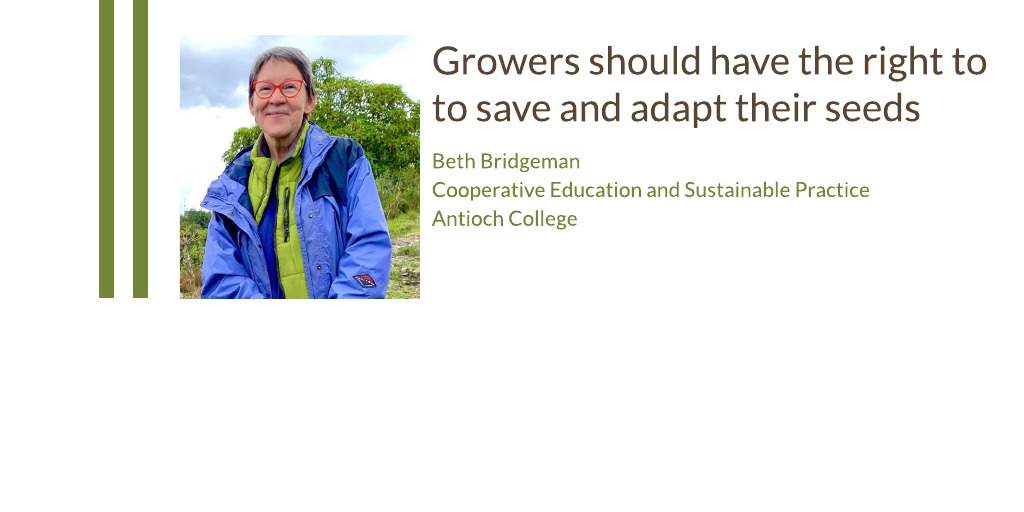
Confront the Climate Crisis

Promote public plant breeding, decentralized seed systems, Traditional Ecological Knowledge (TEK), and organic practices as solutions to mitigating the effects of climate change and helping society adapt to these changes and their consequences.
| Summary |
| Climate change is already severely impacting seed growers. Policy actions and research investments are needed to address the sources of our warming planet, mitigate the impacts to growers, and increase the climate robustness of our seed and farming systems. |
Issue
Seeds are alive and adapt to changing climates through seed saving, selection, and other classical plant-breeding techniques. This adaptation is key for a crop’s survival—mitigating risks for growers and the communities they feed. Farming is getting riskier with wind, ice storms, wildfires, and drought all projected to become more intense and regular. It’s clear that climate change is already severely impacting seed growers. Organic plant breeding and organic seed are key elements of adaptable and resilient farming systems. When these seeds are grown organically, the climate benefits are even greater. Beyond mitigating the impacts of our warming planet, organic practices also reduce greenhouse gas contributions. For example, organic seed is produced without fossil fuel-based fertilizers, a major contributor of greenhouse gas emissions.
The Change We Need
- Advance policy solutions that support growers’ ability to mitigate the risks of our changing climate through resiliency strategies and funding for infrastructure, training, and education to help growers recover from and adapt to the consequences of increasingly extreme and unpredictable weather events.
- Support policies that build local capacity for organic cultivation techniques to address climate stresses, including getting more practitioners or extension advisors on the ground advocating for use of regionally and climate-adapted seed, resilient farming methods, and building networks between local seed keepers to share seeds and farm-trial data across changing-climate bioregions.
- Increase public research dollars for public plant breeding projects that expand genetic diversity in our fields and deliver regionally adapted crops with traits that support resilience and perform well in absence of synthetic chemical inputs with a large fossil-fuel footprint.
- Promote organic agriculture as a climate change solution by incentivizing and removing barriers to organic certification.
- Advocate for strategies that promote and preserve TEK as a critical resource to help diverse communities build resilience and adapt to the effects of climate change.
- Support farmers, growers, and their communities in transitioning to climate-friendly practices that balance economic, ecologic, and health needs.
For more information
OSA Issue Brief: Climate Change and Seed (2022)
Agriculture Resilience Act (2021)
Organic agriculture is a Climate Change Solution (National Organic Coalition)
Oregon Wildfires Threaten Valuable Seed Supplies (The Counter, 2021)
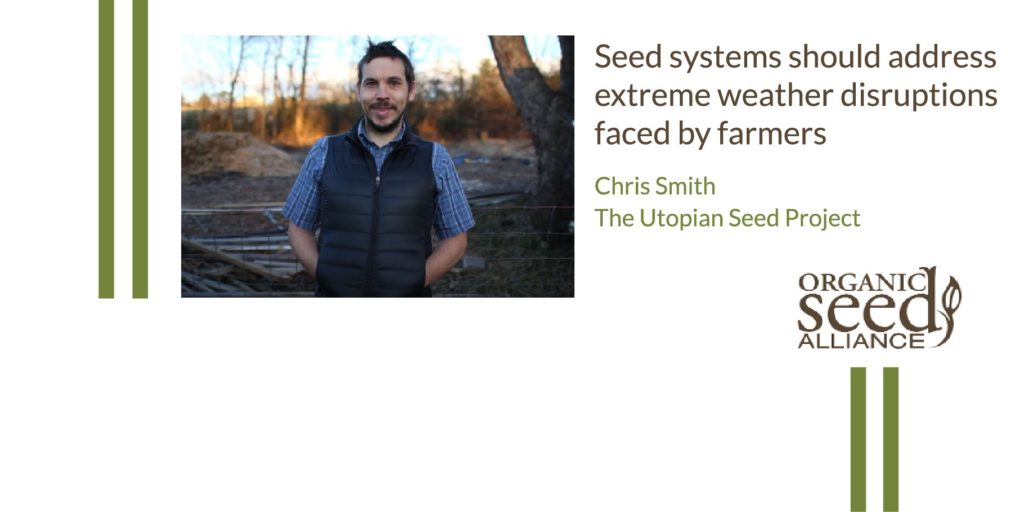
Achieve Equitable Participation in Seed Systems

Advocate for policy initiatives that decentralize power in agriculture and advance equity and justice, including increasing access to seed, land, financial resources, information, political standing, and educational and professional trajectories for BIPOC and underfunded, underrepresented, or historically excluded communities. Support policy change that allows these communities to shape traditional and regional foodways beginning with culturally appropriate seed.
| Summary |
| OSA advocates for policies that center leadership by BIPOC and underfunded, underrepresented, or historically excluded communities in shaping their own culturally relevant foodways as well as removing barriers to equitable participation in all aspects of seed, food, and farming systems. |
Issue
BIPOC and underfunded, underrepresented, or historically excluded groups of growers have long faced barriers to equitable land access, government assistance, research support, and agricultural markets, and this includes organic certification and the organic market, in the U.S. Barriers to organic certification include the three-year transition period, which presents a significant financial hurdle because growers face higher production costs without receiving organic price premiums during the transition. Other barriers include access to capital, training, and technical assistance, and keeping up with the demands of the certification process. OSA views organic agriculture as more than a package of production practices, but a necessary social movement that can create a sustainable and equitable path for our seed, food, and farming systems.
The Change We Need
- Organic seed stakeholders should advocate for policy initiatives that aim to decentralize power in agriculture and advance equity and justice within food and farm policies, programs, and leadership, including respecting the value of knowledge diversity across communal, traditional, and academic settings.
- Support policies that aim to increase justice, diversity, equity, and inclusion in the organic community and agriculture more broadly by focusing on policies and programs that positively impact BIPOC and underfunded, underrepresented, or historically excluded growers’ sustainable access to seed, land, financial resources, organic certification, political standing, and their ability to shape their own food systems, beginning with culturally appropriate seed.
- This includes increasing investments and resources in rural areas and Spanish-speaking communities that have identified seed producer challenges in access to technical assistance, funding, training, education, and research, as well as urban areas where community seed networks combat food insecurity and food deserts through urban farming and community gardening.
- Support policies that improve health, safety, and justice for Migratory and Seasonal Agricultural Workers (MSAWs), including undocumented workers. These groups play major roles in the U.S. agricultural system while facing occupational, health, and legal hazards with little to no protection.
- The Organic Certification Cost Share Program should be restored to its original funding level and continually expanded to match ongoing growth in producers seeking certification.
- The National Plant Germplasm System should address equity and access concerns regarding culturally important seed in their collections, including establishing policies and procedures for properly acknowledging, distributing, and returning seed collections to original stewards or communities of origin, as well as addressing these same concerns for community of origin or BIPOC seed keepers requesting culturally important seeds.
- U.S. policy should respect the rights of Native and Indigenous peoples, including those of the 574 federally recognized American Indian and Alaska Native tribes and villages in the United States as well as the 5 U.S. territories and three freely associated states, to advocate for rematriation of culturally significant seed on their own terms in exercising their right to self-determination as affirmed by The United Nations in their Declaration on The Rights of Indigenous Peoples.
- Hiring practices in public institutions that manage food, seed, and farming systems, such as the National Plant Germplasm System and the USDA, should be more inclusive to better serve the unique needs of diverse communities.
- Research investments should incentivize connecting plant breeding and research priorities with social justice needs in our seed, food, and farming systems, including prioritizing the needs of BIPOC and underfunded, underrepresented, or historically excluded growers and their communities.
- Address access and equity issues in research programs to remove barriers to increasing the diversity of grant recipients and partners.
- Policies advocated for in this platform regarding reinvigorating rural economies, building capacity for regional food systems, and investing in local communities to increase their ability to meet their own agricultural needs should be implemented in ways that are accessible, affordable, and sustainable. The determination of these criteria should reflect real costs and associated losses to farmers, growers, and other applicants.
- Small-scale farmers and growers, as well as BIPOC and underfunded, underrepresented, or historically excluded farmers and growers, should be provided with assistance in meeting any new regulatory requirement that would put them in danger of losing land/farm ownership or access.
- People living and working in rural areas and those who are food insecure should have protected rights to seeds. These individuals in the U.S. should be granted similar freedoms and protections regarding seed use as outlined in the United Nations Declaration on the Rights of Peasants and Other People Working in Rural Areas.
For More Information
National Young Farmers Coalition’s Racial Equity Toolkit
Justice for Black Farmers Act (2021)
Soul Fire Farm Action Steps & Policy Platform for Food Sovereignty
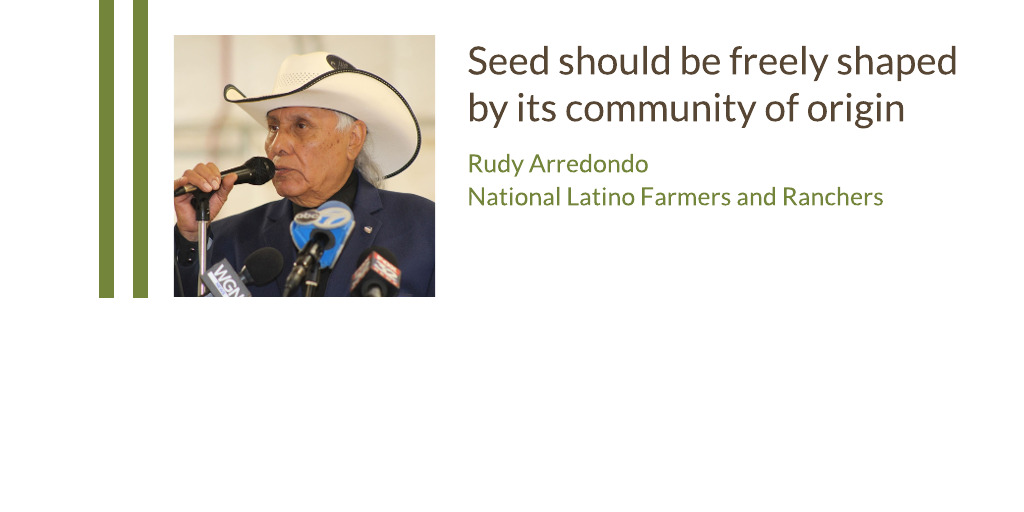
Ensure Public Research Supports the Common Good

Advocate for increased, targeted, and diversified public research investments in organic plant breeding and seed initiatives that hold agencies accountable in prioritizing challenges faced by seed producers and establishing community-university partnerships that strengthen the links between public research and grassroots seed movements.
| Summary |
| Our nation’s public plant breeding capacity is declining and accountability is needed to ensure our public research dollars serve the public good by addressing diverse needs and challenges in ways that don’t harm people or the planet. Publicly funded cultivars should remain in the public domain. |
Issue
Plant breeding is widely recognized as a craft and science for developing or enhancing plant varieties. With plant breeding comes a responsibility to carefully steward the world’s foundation of plant genetics, especially in the context of agriculture. There is an urgent need for increased and targeted research dollars that fund organic plant breeding and other seed system research needs, including in the social sciences. While organic plant breeders are having greater success developing new varieties, challenges remain regarding staffing and capacity for researchers to carry out projects. The plant breeding community is also experiencing significant decline, with a 21 percent decrease in full-time employment over the past five years. This decline makes it difficult to train the next generation of plant breeders and puts at risk our public plant breeding capacity.
The Change We Need
- Public research investments in organic plant breeding and other organic seed research should continue to increase while diversifying who participates in research.
- Public research investments should prioritize the challenges that organic seed producers face. Many of these challenges can be addressed through research, as documented in our State of Organic Seed data. There has been very little public investment in this area compared to organic plant breeding.
- A broader range of governmental funding sources should support public cultivar development. Funding should not overly rely on USDA’s Organic Research and Extension Initiative (OREI).
- Non-government investment models are needed to support research and infrastructure needs of smaller organic seed producers/companies.
- Researchers should continue to emphasize collaborative models with growers and social scientists to ensure meaningful engagement and relevant project deliverables.
- Public research priorities should align with the social principles underpinning the organic movement to ensure that transparency, equity, and justice are central tenets of public investments.
- Public research investments should support community-university partnerships where farmers, seed growers, community food advocates, on-farm plant breeders, and others have access to technical assistance and beneficial collaboration with publicly funded research.
- Public research programs should prioritize historically marginalized growers and their communities.
- Public plant breeding projects should remain in the public domain, free of seed-saving, breeding, and research restrictions to protect innovation and enhance market competition.
For More Information
Summit on Seeds and Breeds for 21st Century Agriculture Proceedings
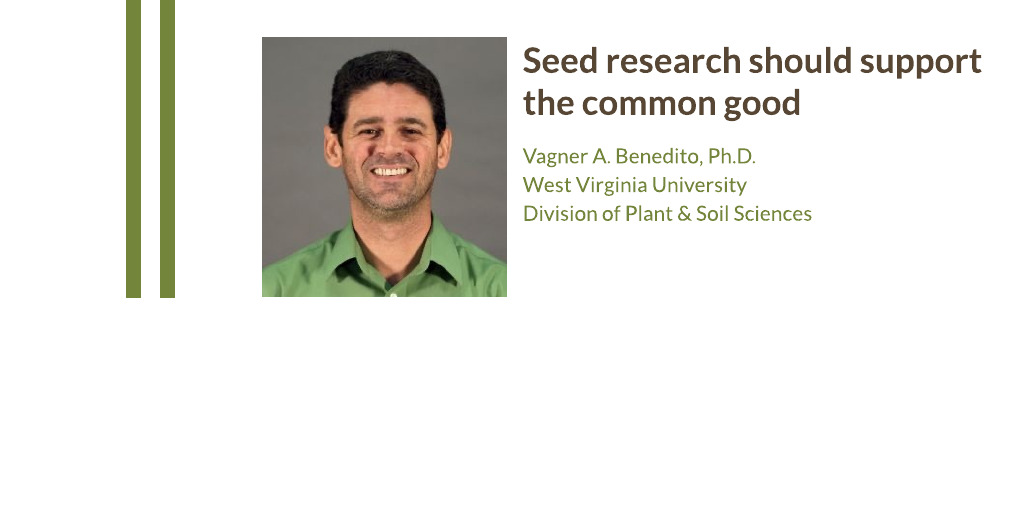
Expand Public Seed Collections

Advocate for adequate funding and management of the National Plant Germplasm System to address the backlog of seed regeneration, protect genetic diversity, and ensure equitable access by growers, breeders, and those working on rematriation as well as prioritizing community of origin seed keepers requesting access to culturally appropriate seeds.
| Summary |
| To combat biodiversity loss caused by seed industry consolidation, we advocate for adequate funding and management of the National Plant Germplasm System to ensure timely, equitable, and culturally appropriate access to seeds. |
Issue
Public germplasm collections, also known as seed banks, are critical to preserving and expanding our rich agricultural heritage. In 1990, Congress established the National Plant Germplasm System (NPGS) within the USDA to maintain and distribute important plant germplasm. They serve several parallel functions, including providing a healthy and stable source of genetic material so that plant breeders and researchers can develop and assess new varieties, distributing seed to impacted regions during periods of instability, and rematriating varieties to Native seed stewards and habitats – preserving the cultural connections between land and seed. This work is pursued in acknowledgement of the harm that colonial and extractive seed regimes have done to Native and BIPOC communities in the past, with the goal of prioritizing leadership from within these communities and mitigating harm to communities of origin when collaborating on seed use in the future. With roughly 250,000 requests for seeds annually, the National Plant Germplasm System requires stable funding to meet high demand. Understaffing is also a primary concern. At least one-third of NPGS managers will reach retirement age by 2025. The value of our germplasm collections cannot be fully realized without dedicated funding for maintaining and growing capacity.
The Change We Need
- Increase public funding for germplasm collections and continue to assess capacity needs.
- Increase public awareness of the important role that public seed collections play in building healthy and resilient seed, food, and farming systems.
- Invest in new tools to efficiently catalog, grow out accessions, and store plant germplasm.
- Involve diverse stakeholders in conversations and strategies on best practices for distributing and properly acknowledging original stewards of seed in the collection.
- Advocate for policies that remove barriers and increase transparency in requesting seeds from the NPGS with input from diverse stakeholders and that support community-based and participatory seed collection pathways, such as seed saving networks, seed libraries, and community seed banks in acknowledgement of the social impacts and biocultural nature of seeds.
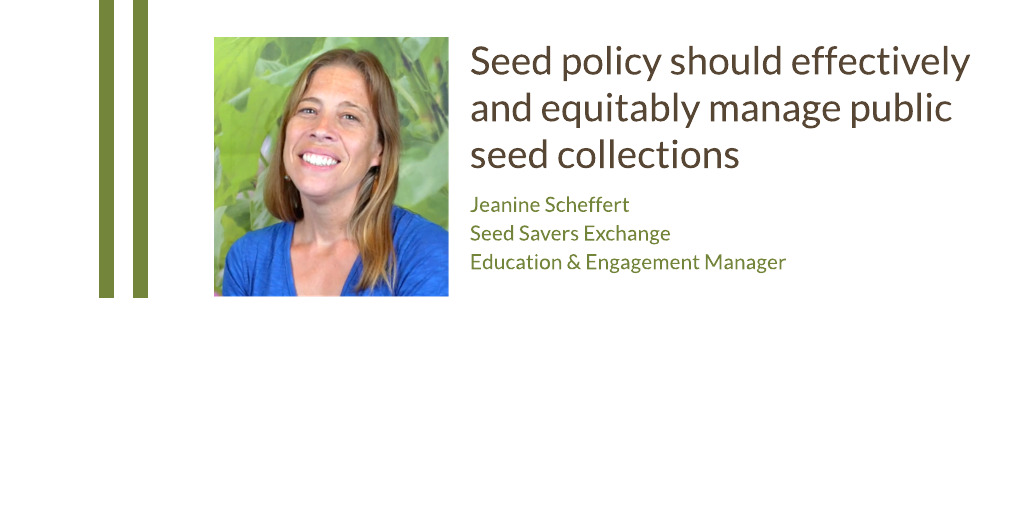
Enhance the Integrity of the Organic Label
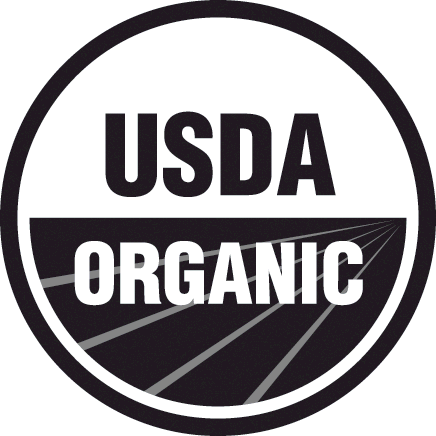
Strengthen the organic seed requirement, help organic producers meet the organic seed regulation, clarify which plant-breeding methods should be excluded or allowed in organic production, and support the organic seed market and the seed growers who fill this supply.
| Summary |
| It is time for organic seed policy to catch up with the progress we’ve seen in organic seed availability by requiring improvement in organic seed sourcing on an annual basis and taking action to protect and enhance the integrity of the organic label. |
Issue
The USDA’s National Organic Program (NOP) requires the use of organic seed when commercially available. However, the organic seed sector was almost nonexistent when the program began and the growth of the organic food industry rapidly outpaced the development of the organic seed industry. Although some market gaps remain, the organic seed supply has grown tremendously over the last 20 years.. Meanwhile, the organic food industry continues to experience fast growth, with sales toppling $56 billion in 2020 (a 12 percent increase compared to 2019). Unfortunately, our State of Organic Seed report, representing fifteen years worth of data, shows no meaningful improvement in organic producers using more organic seed. Most organic producers still source non-organic seed for part (if not all) of their operation. We believe that expanding organic seed production, and requiring organic growers to source more organic seed, will benefit the sustainability of our food and agricultural systems. Policy must follow suit to protect the progress we have made in growing the organic seed supply by ensuring that more organic producers source organic seed and that consumers have access to the increased health and environmental benefits that organic systems provide.
The Change We Need
- The NOP should swiftly implement the NOSB’s 2018 recommendation to update the organic seed requirement, which would mandate that organic producers demonstrate improvement in organic seed sourcing on an annual basis.
- The NOP should also implement the NOSB’s 2019 recommendations for updating the organic seed guidance document to support certifiers and inspectors enforce the seed requirement.
- Clarify that certain methods, such as genetic engineering, should remain excluded from organic (e.g., advocate to keep new techniques, such as gene editing, out of organic).
- The NOP should swiftly adopt the NOSB’s recommendations on the topic of excluded methods.
- The NOSB should continue to evaluate plant breeding methods in the context of the excluded methods definition to provide clarity to organic plant breeders, organic seed producers, and organic certifiers.
- Advocate for policies that add social value to the organic label by removing barriers to equitable enjoyment of its benefits, such as the relationship between increased positive health outcomes and access to organically grown food.
- Support farmers and seed growers in sourcing more organic seed to meet new requirements, including training, technical assistance, and funding for infrastructure and equipment to store, process, and save seeds using organic methods.
- Provide access to funding, research, and technical assistance for new organic seed growers from BIPOC, underrepresented, and historically underserved communities to increase the number and diversity of organic seed producers.
- Address discrepancy in organic seed usage by scale from regulatory and enforcement angles, where the largest producers are using relatively little organic seed compared to smaller operations at times because of buyer/processor contract requirements to grow a particular variety that isn’t available organically.
- Address certification barriers for seed producers who are required to have triple certifications for commercial seed sales: organic certification as a crop producer, organic certification as a handler, and certification of their seed by their respective state seed programs.
For More Information
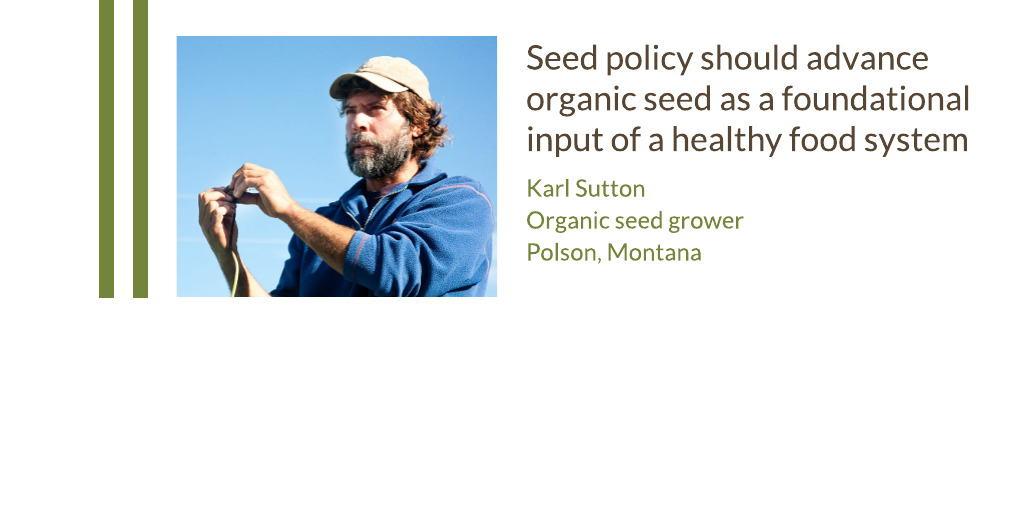
Address GMO Contamination

Address GMO concerns in the organic and non-GMO seed sector and advocate for strong federal policy reform to level the playing field, promote true “coexistence” between GE and non-GE farming systems, and establish fair compensation for economic and other harms associated with GE contamination.
| Summary |
| Genetic engineering is an excluded method in the National Organic Program and yet organic producers and handlers routinely find GE material in their seed and crops. The reality is that there are currently more requirements for organic growers to avoid contact with GE crops than there are for the companies developing, experimenting, and selling GE crops to prevent cross-pollination in the first place. |
Issue
The interface of GE crops and non-GE crops poses significant challenges from a production and handling standpoint and underscores unaddressed policy concerns, yet there has never been a new law written to address the novel nature of biotech crops. Instead, Congress chose to regulate biotechnology using a patchwork of existing laws, some of which predate the technology, and there remains a mishmash of agency interpretations for regulating GE organisms. This patchwork approach has left many holes: the absence of mandated contamination prevention practices, post-market monitoring, and a mechanism for compensating those harmed by contamination. Lacking a robust framework, the organic and broader non-GE community has shouldered the costly burden of protecting their crops and markets from GE material and absorbing the costs and other harms when contamination happens. In 2020, the USDA finalized the first comprehensive update to its biotech regulations since they were developed in 1987. The new regulations are woefully inadequate, establishing a voluntary regulatory system. One major concern with current regulations is that thousands of experimental, open-air field trials of GE crops are taking place across the US without oversight and in absence of a safety review process. This puts US farmers at risk of unwittingly being contaminated by unapproved traits because they are unaware of experimental trials in their area.
The Change We Need
- Growers and owners of GE crops must share the responsibility of mitigating GE contamination.
- Assign liability for harm caused by GE contamination to the seed patent holder.
- Require regulatory oversight of experimental field trials and transparency to area growers.
- Mandate disclosure of the market introduction of GE crops.
- Require independent analysis of social, economic, and environmental effects prior to deregulation.
- Establish strict monitoring and containment measures post-commercialization.
Support State-Level Policy Initiatives

State-level seed policy can fill gaps at the federal level to strengthen protections for organic and non-GE seed and seed growers
| Summary |
| State-level seed policy can fill gaps at the federal level to strengthen protections for organic and non-GE seed and seed growers States can play an important role in protecting farmers during patent infringement investigations, fighting seed preemption bills, and protecting key seed-growing regions. |
Issue
There are federal regulatory gaps and limited state protections for organic and non-GE seeds. Some states have attempted to enact safeguards through legislation. Oregon seed growers have undertaken the most advocacy attempts, likely owing to more critical and immediate threats in key seed growing areas of the Willamette and Rogue Valleys. The Pacific Northwest is one of the top five seed-growing regions in the world due to its climate and other growing conditions. Some of the threats to seed growers in this region include large-scale production of canola, which introduces harmful diseases to specialty crop seed as well as genetically engineered traits. Genetically engineered sugar beets are also mostly grown in this region, threatening the genetic integrity of table beets, chard, and other crops that fall within the beta vulgaris species. Across the country, state legislation related to seed has most often come in the form of seed preemption bills, which remove any local authority over the cultivation, harvesting, production, processing, registration, labeling, marketing, sale, storage, transportation, distribution, possession, notification of use, use, and planting of agricultural seeds or vegetable seeds (yes, this legislation that has passed in more than 25 states is this broad). These preemption bills are a corporate-led reaction to county bans on growing GMOs in Oregon and other states. States also can play a role in monitoring and investigating antitrust concerns in the seed industry, implementing stronger controls on experimental trials of GE crops, and protecting farmers from intrusive patent infringement investigations and lawsuits.
The Change We Need
- Increase transparency of experimental GE field trials and give more regulatory authority to state departments of agriculture so they have knowledge of locations and oversight of these field trials in their state.
- Resist and/or reverse state seed preemption laws that have passed in more than 25 states.
- Support policies to prevent GMO contamination of organic and non-GE crops.
- Ban large-scale canola production, which can introduce pests and GE traits, in high-value seed production regions, such as the Willamette Valley in Oregon.
For More Information
A Seed Policy Roadmap for the Pacific Northwest

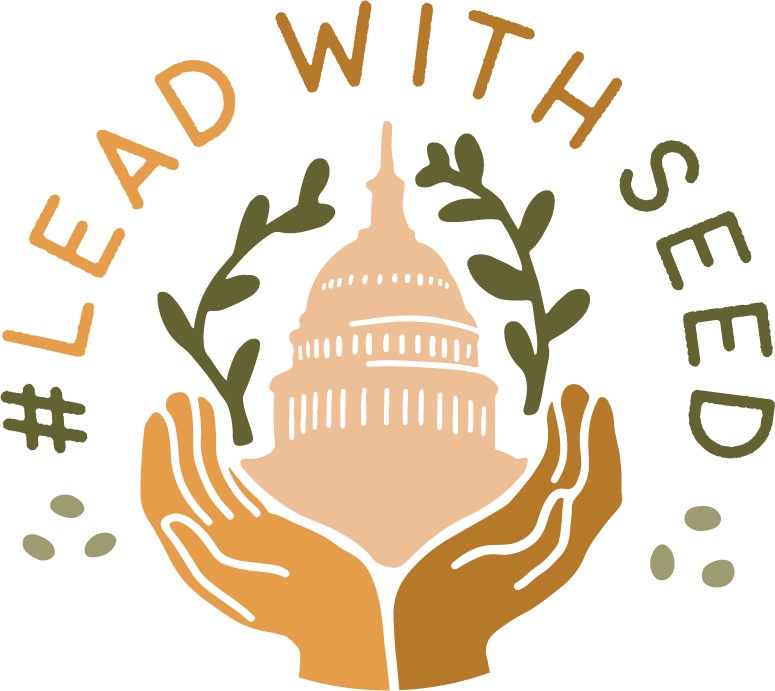
HOW TO ENGAGE
1. Join the growing network of seed policy advocates. Add your name to the list of individuals, organizations, and businesses supporting this platform. By joining the list, you will help us demonstrate a broad base of support for decentralized seed systems grounded in the principles of the organic movement. You will also be notified of timely policy actions calling for policy makers to #LeadWithSeed in the next Farm Bill (you can unsubscribe at any time).
2. Help us build grassroots power. Share this platform with friends, family, colleagues, and others in your networks and community, and on your social media accounts (view our toolkit here).
3. Share your story. If you have a story to share — a direct experience with any of the topics in this platform that may be useful to our campaign — please get in touch!
GLOSSARY
5 US territories and 3 freely associated states: official terminology developed by The Office of IslandAffairs in the Center for State, Tribal, Local, and Territorial Support (CSTLTS) to refer to the five island territories controlled by the US and the three independent island nations that operate under a Compact of Free Association with the US.
The 5 US territories and their locations are:
- Pacific Ocean: American Samoa, the Commonwealth of the Northern Mariana Islands (CNMI), and Guam
- Caribbean Sea: Puerto Rico and the US Virgin Islands (USVI)
The 3 freely associated states and their locations are:
- Pacific Ocean: the Federated States of Micronesia (FSM), the Republic of the Marshall Islands (RMI), and the Republic of Palau (Palau).
Migratory and Seasonal Agricultural Workers (MSAWs): persons employed either as a migratory or seasonal agricultural worker per the listed definitions below. This category does not denote immigration or citizenship status.
Definitions from US Department of Health and Human Services: Rural Health Information 2021
“A migratory agricultural worker, often called a migrant farmworker, is defined by section 330(g) of the Public Health Services Act as “an individual whose principal employment is in agriculture on a seasonal basis…and who establishes for the purposes of such employment a temporary abode.”
The Health Resources and Services Administration (HRSA) defines seasonal agricultural workers (seasonal farmworker) as “individuals whose principal employment is in agriculture on a seasonal basis and who do not meet the definition of a migratory agricultural worker.” Generally, migratory and seasonal farmworkers are hired laborers who are paid by piecework, by the hour, or on a daily basis.”
Peasants: international term used to denote persons living in rural areas and earning sustenance living by working the land through traditional methods.
Definition from the United Nations Human Rights Council 2013:
Declaration on The Rights of Peasants and Other People Working in Rural Areas
Article 1
- “A peasant is a man or woman of the land, who has a direct and special relationship with the land and nature through the production of food or other agricultural products. Peasants work the land themselves and rely above all on family labour and other smallscale forms of organizing labour. Peasants are traditionally embedded in their local communities and they take care of local landscapes and of agro-ecological systems.
- The term peasant can apply to any person engaged in agriculture, cattle-raising, pastoralism, handicrafts related to agriculture or a similar occupation in a rural area. This includes indigenous people working on the land.
- The term peasant also applies to the landless. According to the Food and Agriculture Organization of the United Nations definition, the following categories of people are considered to be landless and are likely to face difficulties in ensuring their livelihood:
- Agricultural labour households with little or no land;
Non-agricultural households in rural areas, with little or no land, whose members are engaged in various activities such as fishing, making crafts for the local market, or providing services;
- Other rural households of pastoralists, nomads, peasants practising shifting cultivation, hunters and gatherers, and people with similar livelihoods.”
Traditional Ecological Knowledge (TEK): historically accumulated place-based and culturally-informed knowledge cultivated through relationships between people and their ecosystem that is maintained through traditions passed down to future generations.
See definition below for specific cultural contexts in the U.S.
US Department of the Interior: National Park Service
Traditional Ecological Knowledge (TEK) is the on-going accumulation of knowledge, practice and belief about relationships between living beings in a specific ecosystem that is acquired by indigenous people over hundreds or thousands of years through direct contact with the environment, handed down through generations, and used for life-sustaining ways. This knowledge includes the relationships between people, plants, animals, natural phenomena, landscapes, and timing of events for activities such as hunting, fishing, trapping, agriculture, and forestry. It encompasses the world view of a people, which includes ecology, spirituality, human and animal relationships, and more.
TEK is also called other names, such as Indigenous Knowledge, Native Science.
Indigenous peoples as well as non-Indigenous peoples who are long-term (hundreds of years) local residents, e.g., Appalachian communities, Spanish land grant communities, can also provide TEK.
